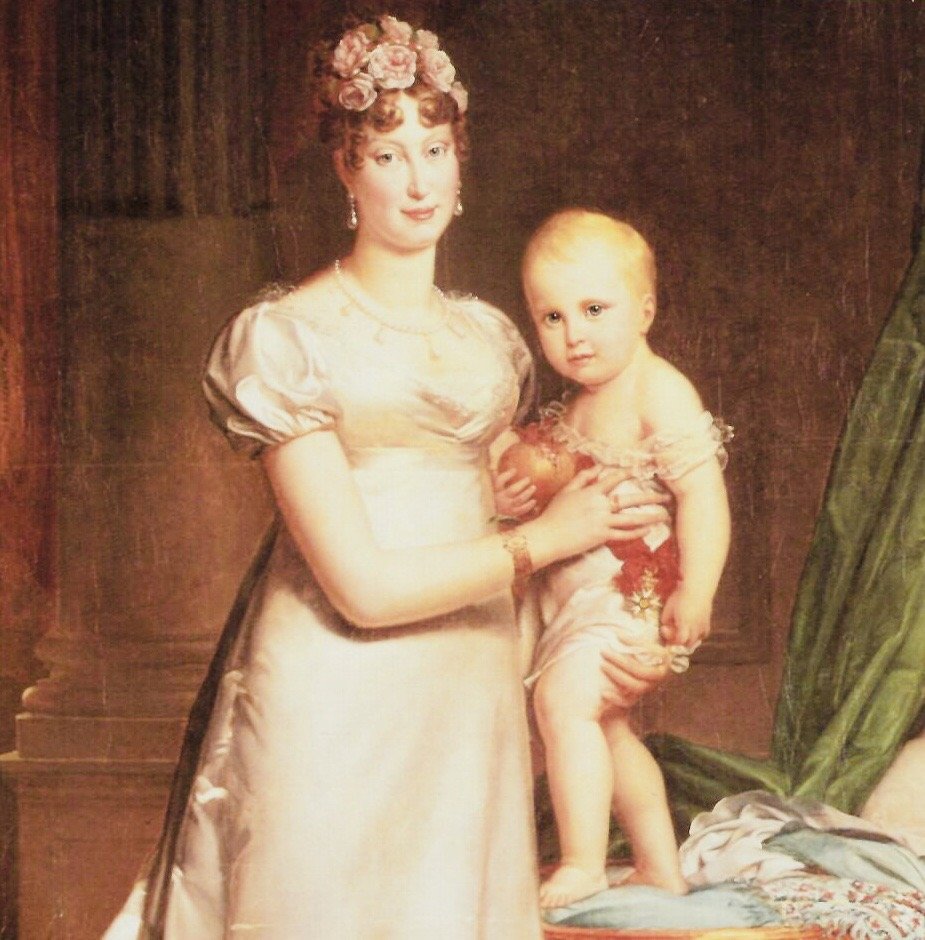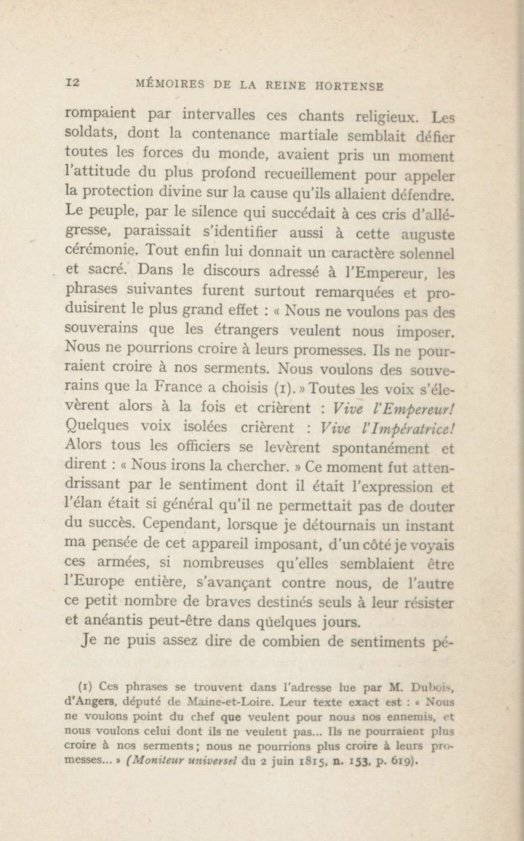Let’s have another look at Hortense’s Memoirs. If you want to read the book it is available for free at the side bar in English and French. Use the widget on the sidebar to translate the text below into pretty much any language.
This book has been suppressed. I believe that has been the case, in part, because it shows the trickery of Napoleon’s second marriage. The nature of that trickery shows far more about Napoleon’s enemies than they want the public to understand about how they maintain power.
Hortense’s memoirs continues:
An idea which particularly preoccupied the Emperor was the degree of affection which Empress Marie Louise still felt for him. Her majordomo had just arrived in Paris. He was an intimate friend of Monsieur Devaux, who was still in my employ. The Empress's steward told Monsieur Devaux that the Emperor had sent for him and asked many questions regarding the Empress.
The servant was asked what letters he had brought with him to deliver. There was only one for the Duchesse de Montebello, and he had not dared hand this over to the Emperor because he knew it contained this sentence "I am closely watched, but you who know my opinions know how unnecessary this is."
Since, on the other hand, the steward feared to get into trouble if he attempted to conceal the truth, he came to ask Monsieur Devaux to advise him what course to pursue. Monsieur Devaux referred the matter to me.
This is what I told him: "Who employs this majordomo? He should carry out his employer's orders. To do otherwise is to betray his mistress and fail in his duty."
My advice was taken. The letter was delivered to the Duchesse de Montebello, and the Emperor knew nothing about it. All the reports we received agreed that Empress Marie Louise had declined to return to France. The Emperor seemed hurt by this desertion. I noticed this one day when he was speaking sympathetically to me about my mother and said: "I have no portrait of Empress Josephine. I should be pleased if you gave me one."
I sent him one which Quaglia had painted on a porcelain cup. The preparations for the ceremonies of the Champ de Mai were now completed. The delegations of electors (colleges electoraux) were arriving from every part of France as well as delegates from all the regiments in the army.
The cabinet ministers were supposed to receive them. The Emperor wished me to attend an evening reception given by Carnot, minister of the interior. I did so. The gathering was a large one and the musical part of the program was executed by the students of the Conservatory.
The concert ended with a song of mine, of which the refrain was, "We must defend our country." It was very appropriate, but I was almost embarrassed by the effect it produced.
Before leaving I spoke to everyone, and received from the heads of the delegations and the deputies the most solemn assurances of their devotion and affection for the Emperor's dynasty. Yet so many professions of loyalty, although too spontaneous not to be sincere, did not make much of an impression upon me when I stopped to think that a momentary setback would destroy their effect.
The day on which the ceremony of the Champ de Mai was to take place arrived at last. The Emperor was again to be proclaimed head of the French nation by a gathering of its representatives. The scene on the Champ de Mars was a most magnificent and impressive one. The center of the great field was filled with troops and the National Guard. A special enclosure was reserved near the Ecole Militaire for the legislative bodies and the delegations from the army.
The latter bore the former flags, the tricolors which they had been so reluctant to surrender and which were about to be blessed and returned to them. Opposite the throne was an altar surrounded by the clergy, and behind the throne a gallery for the princesses and the members of the court.
When the Emperor appeared, tumultuous cheers broke out. The Te Deum was sung but its solemn strains were interrupted by sounds of military music. The soldiers, whose martial aspect made them seem capable of defying the entire universe, assumed an attitude of devotion as they solicited divine protection on the cause they were about to defend.
The masses of spectators by their silence, following their frantic outburst of joy, seemed to share the solemnity of the moment. The entire character of the ceremony was most awe-inspiring. In the speeches made to the Emperor the following phrases were particularly noticed and attracted the most attention "We will no longer accept those rulers whom foreign powers have imposed on us. We cannot trust their promise; they cannot trust our oaths of allegiance. We wish rulers whom France shall herself have chosen."
At this moment a vast cry went up, "Long live the Emperor!" A few scattered shouts were heard of "Long live the Empress!"
Suddenly the officers rose and exclaimed, "We shall go and bring her back." The moment was a dramatic one on account of the emotion that prevailed and the unanimity of sentiment which made failure seem impossible. Yet when I momentarily turned my eyes from the martial display before me I conjured up a vision of those other armies, the leagued forces of all Europe bearing down upon us, and our defenders this little group of heroes, who alone would resist them and who might be annihilated in a few days' time.
I cannot describe what gloomy forebodings filled my heart. Several persons noticed my emotion, and when the Emperor had proceeded to the middle of the Champ de Mars where he was to distribute the eagles and review the troops the Duc d'Otrante stepped up to me and inquired the reasons for my mournful air.
“Ah," I replied, "beyond all this ceremony lies the menace of war and that idea is a dreadful one."
“What else can you expect?" he said. "The Emperor has just missed a great opportunity. I advised him to abdicate today. Had he done so, his son would have succeeded to the throne and war would have been avoided."
“Alas!" I answered, "the thought of that conflict is a torture to me." But it would have needed more than human qualities not to have been affected by all this enthusiasm. Perhaps too the Emperor thought that instead of placing his son on the throne his retirement would merely have hastened France's downfall. It was natural when I saw so many of my country’s brave defenders gathered together in one mass that I should think of my brother, who was absent.
He still formed a target for jealous hatred, doubts were expressed regarding his fidelity to the imperial cause, and the Emperor himself said to me one day, "Why does not your brother come back? One can always escape in disguise. A man can always go anywhere if he really wants to."
“Sire," I replied, "you know he is in danger of being imprisoned if he does not remain neutral, and he is not a man to break his parole." After the ceremony of the Champ de Mai we also attended the opening of parliamentary session.
The days that followed were taken up 'by farewells which had never been more painful, for although we never had a more just cause to defend, we had never been faced with more obstacles.
The original French is available below:









